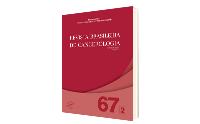Risk of Hepatocellular Carcinoma Recurrence After the Use of Direct-Acting Antivirals in the Treatment of Hepatitis C: Systematic Review and Metanalysis
DOI:
https://doi.org/10.32635/2176-9745.RBC.2021v67n2.1220Keywords:
Carcinoma, Hepatocellular/etiology, Recurrence, Antiviral Agents, Hepatitis C/complicationsAbstract
Introduction: Hepatitis C is associated with the development of hepatocellular carcinoma (HCC). The interferon-based therapeutic regimen has been replaced by direct-acting antivirals (AAD) to treat HCV virus infection. However, recent studies have shown an unexpected increase in HCC recurrence in patients treated with AAD to resolve hepatitis C. Objective: To assess the risk of hepatocarcinoma recurrence after using AAD in patients with HCV infection. Method: A survey was carried out in PubMed, MEDLINE, and LILACS databases according to the descriptors DeCS/MeSH ((hepatocellular carcinoma) AND recurrence) AND Directacting antiviral. The review followed the PRISMA protocol and is registered on the PROSPERO platform. The data statistical analysis was performed through RStudio software. Results: Seven articles were selected resulting in 847 patients. Among those treated with AAD, the recurrence rate varied between 11.1% to 42.1% and, in the control group, it occurred in 5% to 65.6% of the patients. The relative risk (RR) of recurrence of HCC in the group of patients who received AAD was less than the risk evidenced in the control group, although there is no statistical significance (RR 0.71 95% CI [0.55; 0.93] I2=38%, p=0.14). The mean time until the diagnosis of recurrence was 9.35 months in the group exposed to therapy and 13.42 months in the control group. Conclusion: It is suggested that therapy with AAD does not increase the risk of HCC recurrence compared to control groups. In patients who developed recurrence, it occurred more frequently within the first year after the introduction of AAD.









